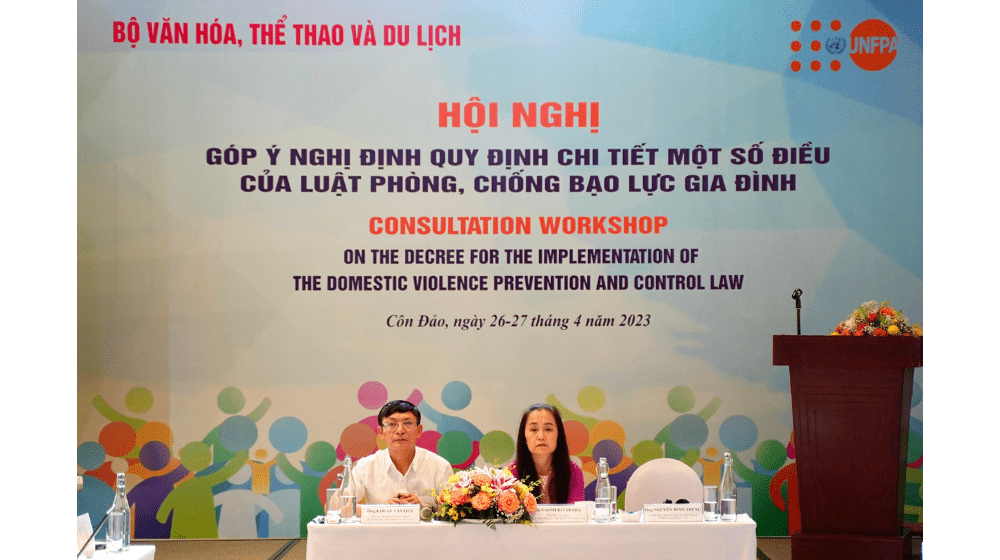Con Dao, 26 April 2023 - Today, officials from relevant Government’s ministries and agencies and various stakeholders discussed and provided valuable and constructive inputs to the draft Decree on the implementation of the 2022 Law on Domestic Violence Prevention and Control (DVPC Law). The Ministry of Culture, Sports and Tourism plans to submit the draft Decree to the Prime Minister for approval in May 2023.
The Decree has been prepared by the Ministry of Culture, Sports and Tourism, consisting of 6 chapters and 44 articles. Key issues stipulated in the draft Decree include, among others, the national hotline mechanism for domestic violence prevention and control and how to receive and handle notifications and denunciations of domestic violence; no-contact order and how and when it can be applied; and the establishment and operation of domestic violence prevention and control facilities. The draft Decree also explains regulations on the annual allocation of the state budget for domestic violence prevention and control, particularly for education and support for behavioural change.
The workshop, held in Con Dao, Ba Ria – Vung Tau, was co-chaired by the Ministry of Culture, Sports and Tourism and UNFPA Viet Nam. Attended the workshop were representatives from the Government’s ministries and agencies and from the Ba Ria - Vung Tau Provincial authorities. The participants were also from the international organizations, social organisations and local media.
Speaking at the workshop, Mr Khuat Van Quy, Deputy Director of the Family Department, Ministry of Culture, Sports and Tourism said: “The draft Decree, with a number of articles in the 2022 Law on Domestic Violence Prevention and Control, is an important legal document to ensure the implementation of the 2022 Law. Therefore, this consultation workshop plays a significant role in supporting the Ministry to finalise it.”
Meanwhile, in her opening remarks, Ms. Naomi Kitahara, the UNFPA Representative for Vietnam called for a consistent application of the rights-based and gender-sensitive approaches during the drafting of the Decree to protect the rights of survivors of violence and ensure the responsibilities and obligations of the perpetrators.
Ms Naomi Kitahara stressed: “UNFPA commits to accompanying the Government of Viet Nam in the path to ending violence against women and girls. We want to ensure that all women and girls in Viet Nam, including those most vulnerable, have the right to live a life free of violence and with dignity. No one should be left behind in the country’s sustainable development process.”
High on the discussion during the workshop include regulations for new measures such as the national hotline services, protective orders and contact prohibitions, and facilities to support the survivors of domestic violence.
A representative from the Ministry of Labour, Invalids and Social Affairs commented that responsibilities of the perpetrator to cover the fee of accommodation and living expenses of survivors would require careful consideration for its feasibility.
Commenting on the regulations relating to receiving and handling notifications and denunciations of domestic violence, a representative from the Public Security Department of Ba Ria – Vung Tau province stressed that the draft Decree had covered the key procedures on how to receive and handle as well as to ensure the confidentiality of domestic violence. However, he added: “The Decree should specify such a process more in detail. When handling DV incidences, the Decree should also include the procedures for multi-sectoral coordination.”
A representative from the Vietnam Women’s Union shared her recommendations: “The procedures on implementation of a no-contact order should protect the benefits of all people concerned. Relating to the regulation on the application of the protective order, the Decree should specify the period of such an order. Procedures to govern violation of the protective order are also needed.”
All the comments and recommendations raised at this consultation workshop as well as those received in writing prior to the workshop will be incorporated into the draft Decree to ensure transparency, feasibility and accessibility, thus facilitating the implementation of the DVPC Law.
Note to Editors:
Gender-based violence/domestic violence in Vietnam
Even though the DVPC Law was in place since 2007, the prevalence of violence against women (VAW) by their husbands/intimate partners is still an alarming issue. According to the 2nd National Study on VAW in Vietnam in 2019, 90.4 percent of GBV survivors did not seek help from authority and half of them never told anyone about the violence. Additionally, the national productivity losses as a result of VAW were equal to 1.81 percent of Viet Nam's 2018 GDP.
UNFPA’s model of One Stop Service Centre and hotline
UNFPA has provided technical and financial support for the establishment and operation of two models to protect and support women and girls, especially survivors of gender-based and domestic violence. They include the 24/7 toll-free hotline run by the Vietnam Farmers’ Union and four One Stop Service Centres, also known as Anh Duong House run by the Ministry of Labour, Invalid and Social Affairs and CSOs. Anh Duong House provides essential, comprehensive and integrated services to women and girls who are experiencing and/or at risk of gender-based and domestic violence.
Up to March 2023, the hotline received more than 11,300 calls and provided consultation and support to nearly 1,400 women and girls suffering from gender-based and domestic violence. Meanwhile, four Anh Duong Houses have directly supported nearly 50 GBV survivors at the House as well as around 150 GBV survivors in the community.
For further information, please contact:
UNFPA Communications Officer: Ms. Đinh Thu Hương,
email: dhuong@unfpa.org; mobile: 0913301539
Ministry of Culture, Sports and Tourism: Mr. Phạm Quốc Nhật,
email: quocnhat.vugiadinh@gmail.com; Mobile: 0988741639


